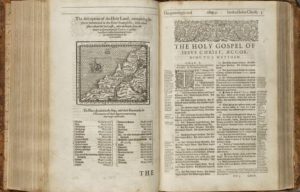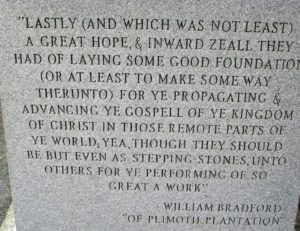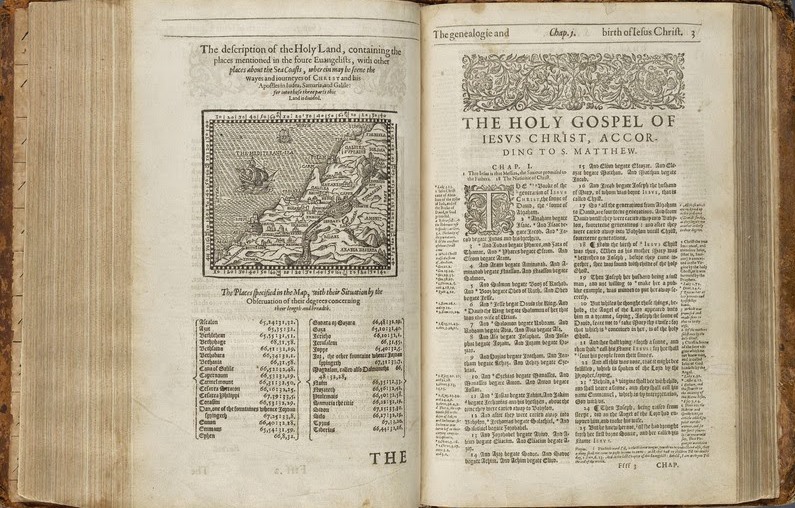
“Being thus arrived in a good harbor and brought safe to land, they fell upon their knees and blessed the God of heaven, who had brought them over the vast and furious ocean, and delivered them from all the perils and miseries thereof, againe to set their feete on the firme and stable earth … Having undertaken, for the Glory of God and advancement of the Christian Faith and Honor of our King and Country, a Voyage to plant the First Colony.” —William Bradford, Of Plymouth Plantation
In the earliest days in this land, when Christians experienced hard times, their desperation caused them to rely on God. Conversely, when things are going well, we often choose to rely on ourselves. Throughout history, the Lord often allowed persecution in order to turn people back to Him. Men came to these shores hoping to establish a God-fearing settlement that would flourish on faith and freedom.
Devout Christian, Mayflower Pilgrim, and Plymouth Colony Governor of thirty-one years, William Bradford died in 1656. Near the end of his life, an entry in Bradford’s chronicle of the colony reveals evidence of how difficult it can be to avoid subtle moral erosion in a society. He saw similarities in the material success achieved at the Plymouth Plantation and the wealth enjoyed by England, both of which came at the price of spiritual decline.
Historians disagree about the reasons for Bradford’s disdain over prosperity and sin, but here is one of the final entries in his journal lamenting the dispersal of the original church community:
O sacred bond, whilst inviolably preserved! How sweet and precious were the fruits that flowed from the same! But when this fidelity decayed, then their ruin approached. O that these ancient members had not died or been dissipated (if it had been the will of God) or else that this holy care and constant faithfulness had still lived, and remained with those that survived … But (alas) that subtle serpent hath slyly wound himself under fair pretenses of necessity and the like, to untwist these sacred bonds and ties . . . I have been happy, in my first times, to see, and with much comfort to enjoy, the blessed fruits of this sweet communion, but it is now a part of my misery in old age, to find and feel the decay and want thereof (in a great measure) and with grief and sorrow of heart to lament and bewail the same. And for others’ warning and admonition, and my own humiliation, do I here note the same.
Bradford was grieved about their apparent failure to meet or live by the high biblical standards expected of them because in the early days, Christians took their faith seriously and were committed in their pursuit of holiness as individuals and as a community. Do we experience that kind of grief, sorrow, and heartache over our own sins and the spiritual condition of our culture?
On April 8, 1630, nearly ten years after the Pilgrims landed at Plymouth Rock, a fleet of eleven ships left England from the Isle of Wight. Carrying more than 700 Puritans, plus livestock and provisions, they hoped to begin a new colony in Massachusetts Bay, free from religious persecution by the Church of England. Understanding the dangers of such a journey and aware that half of the Pilgrims who settled in Plymouth had died, many Puritan leaders were so concerned England was declining spiritually they believed the chance for religious freedom in the New World outweighed potential hardships, including death!
Sailing west on the ship Arbella, an English Puritan lawyer by the name of John Winthrop was part of the first large wave of immigrants and a leading founder of the Massachusetts Bay Colony, the first major settlement in New England. Winthrop would serve as governor for the first twelve years, settling in the Shawmut Peninsula and founding what is now Boston. An estimated 200 people died from disease and a variety of other causes in the first several months, including Winthrop’s son Henry. Encouraging other colonists to trust in God and work hard, Winthrop is said to have joined workers and servants in manual labor to set an example so that “there was not an idle person to be found in the whole plantation.”
It’s interesting to note years earlier in England, Winthrop was first tutored at home and was regularly exposed to religious discussions between his father and clergymen, resulting in his knowledge of spiritual things at a very young age. This led to his admission to Trinity College when he was just fifteen years old. His strong religious upbringing and education would help set the tone for America for many generations.
You are the light of the world. A city set on a hill cannot be hidden; nor does anyone light a lamp and put it under a basket, but on the lampstand, and it gives light to all who are in the house (Matthew 5:14-15).
During the journey to America, Winthrop wrote and delivered a lay sermon to the people based on the above Scriptures. Entitled “A Model of Christian Charity,” he envisioned a unified new colony ordained to build “a City upon a Hill” dedicated to God. This famous work originally inspired the idea of American exceptionalism. With an emphasis on individual responsibility, integrity, and group discipline, his writing described how to keep the colony strong in faith and committed to God in the endeavor of creating a holy community.
Politicians as diverse as John F. Kennedy, Ronald Reagan, Michael Dukakis, and Sarah Palin have quoted or referred to John Winthrop in speeches. He seemed to know the Massachusetts Bay Colony would be “watched by the world,” and the Puritans would either set an example of righteousness and “find that the God of Israel is among us,” or if they failed to uphold their covenant with God, “we shall be made a story and a by-word through the world” and could incur God’s judgment. Winthrop’s Bible-inspired writings dominated the development and growth of New England and influenced the government of neighboring colonies.
Though Winthrop’s godly influence can be seen in the first couple hundred years in America, we now know it is much easier to slide down to the world’s ways than to stay close to God and pursue holiness.
Millions of religious people today have not had in-depth teachings on the Bible and spiritual things. How many can name all Ten Commandments or perhaps books and authors of the Bible? How many can share the whole gospel including the need for redemption through the blood of Christ? What we have is increasing ignorance of the Word of God and American history, as well as a disinterest in Christianity and spiritual things.
For many decades, the truth about our Christian heritage has been downplayed or worse, forgotten. Moreover, how can we avoid repeating the most disappointing parts of our history if cautions from our founders and warnings from Christian leaders are no longer taught and remembered?
Resolution One: I will live for God. Resolution Two: If no one else does, I still will. Jonathan Edwards
One of America’s greatest theologians was Jonathan Edwards (1703-1758), a Congregational preacher and missionary in New England and grandfather of Aaron Burr, the third Vice President of the United States. Edwards was a man of hard preaching with a heart for God’s glory above all things, which is what drove him. This led him to compose a set of resolutions to guide his conduct in all areas, from his battle against sin to the use of his time.
Edward’s famous sermon, “Sinners in the Hands of an Angry God,” is credited for starting the First Great Awakening in America. He wrote about the previous decade, saying it represented a far more “degenerate time” than ever before. Preaching in Northampton, Massachusetts, and Enfield, Connecticut, in 1741, Edwards delivered strong words to the Puritans at that time by saying:
Yea, God is a great deal more angry with great numbers that are now on earth: yea, doubtless, with many that are now in this congregation, who it may be are at ease, than he is with many of those who are now in the flames of hell … The wrath of God burns against them, their damnation does not slumber; the pit is prepared, the fire is made ready, the furnace is now hot, ready to receive them; the flames do now rage and glow … and the pit hath opened its mouth under them.
Among his many riveting resolutions was this one about living with an eternal perspective:
I resolve to endeavor to my utmost to act and think as if I had already seen the happiness of heaven and the torments of hell.
Like Edwards, many dedicated, outspoken men of God wrestled with what they knew from the Holy Scriptures, concerned with the lures and perils of the secular world surrounding them. The enemy uses whatever and whomever he can to distract us and draw us away from God.
Speaking to record crowds and traveling the thirteen colonies on a revival tour at that time was the great preacher and orator, George Whitefield, with whom Edwards was somewhat acquainted. Entire chapters and books have been written about these men and others of great faith who impacted Christianity and America. God-fearing, committed men have often been used by the Lord as catalysts of repentance and spiritual regeneration in society.
One common characteristic men of God possess is the willingness to give their all for Christ, hoping to store up treasures in heaven. Edwards had asked for a loan from the trustees at Harvard during his short time as president, and Whitefield struggled with debt from orphanages he had started in Georgia and in England.
Traveling at a time when sailing was primitive, Whitefield made thirteen trips across the Atlantic Ocean. Many believe the diligence and sacrifice of George Whitefield helped turn two nations back to God. Jonathan Edwards was leading the charge in America while the great John Wesley was preaching up a storm in England. George Whitefield completed this trio of godly men who at that time were primarily responsible for waking up the church and reconciling the lost to Christ on both sides of the Atlantic.
While emphasizing salvation by God’s grace alone, Whitefield presented the gospel and concluded his sermons with “Come poor, lost, undone sinner; come just as you are to Christ!”
Prior to preaching his last sermon on September 29, 1770, Whitefield looked up and prayed:
Lord Jesus, I am weary in thy work, but not of thy work. If I have not yet finished my course, let me go and speak for thee once more in the fields, seal thy truth, and come home and die.
He was given strength for what would be his last sermon. The subject was faith and works. Although scarcely able to stand when he first arrived, he preached for two hours to a crowd that no building could have held. Whitefield died the next morning.
After these three godly men came Fisher Ames, who was born in 1758. His father died when Fisher was six years old, but his mother was determined to provide her son with a classical education in spite of her limited income. Fisher began to study Latin and when he was twelve years old, he attended Harvard College, graduating in 1774 at the age of sixteen. He went on to become a lawyer, a Founding Father, and the author of the First Amendment of the Constitution. As did most of our founders, he believed the Bible to be the best source of all learning.
Having beat Samuel Adams, Fisher Ames was elected to the First United States Congress and served a total of three terms representing Massachusetts. Being concerned about a “dangerous trend” taking place in education and around 1800, Ames stated:
We’ve become accustomed of late to putting little books in the hands of children containing fables with moral lessons. We are spending less time in the classroom on the Bible, which should be the principle text in our schools. The Bible states these great moral lessons better than any other man made book.
The spiritual battle for the hearts and minds of young children was already underway! Here is the author of the First Amendment, which includes the free exercise clause protecting public expressions of faith and religion, voicing concerns over 200 years ago. And today in government schools, a Christian can be scolded or disciplined for doing the very things our founders set out to protect – reading, studying, and quoting the Bible.
We can look back at those times and ask why religious leaders and the people seemingly failed to heed the warnings. We may also wonder how Ames and others had the commitment and insight to make such admonishments. It is as if they knew the consequences of Christian silence and inactivity would include a culture that has almost completely blotted God out of America. Signs were unmistakable all along that this country was gradually losing the battle for righteousness.
United States history indicates that prior to the acceleration of our moral decline, Christians in the 1800s were gaining converts, momentum, and influence. Some consider that century the greatest missionary century in history. Our culture, institutions, laws, and businesses were carried along and led by Christians who, for the most part, were not ashamed to live their faith publicly and discuss spiritual things.
They firmly believed America was a Christian nation and strived to live accordingly. However, the impact of the industrial revolution would soon be seen in society as well as in the church. Business, prosperity, and worldly success brought about a whole new set of problems in life. It’s no wonder many past presidents and political leaders called for repentance among the people. Even the United States Congress once issued an official Proclamation of Thanksgiving and Prayer on October 18, 1780, calling on Americans “to cause the knowledge of Christianity to spread all over the Earth.”
President Abraham Lincoln also recognized the nation’s need for repentance in 1863 as he designated “a national day of humiliation, fasting, and prayer.” Acknowledging the nation’s growth and success, Lincoln was concerned the people had forgotten God so he requested all Americans abstain “from their ordinary secular pursuits, and to unite, at their several places of public worship and their respective homes, in keeping the day holy to the Lord.” In gratitude for the gracious gifts of the Most High God, Lincoln was determined to move the people to confess their sins and ask for God’s mercy as well as the restoration of the country:
All this being done, in sincerity and truth, let us then rest humbly in the hope authorized by the Divine teachings, that the united cry of the Nation will be heard on high, and answered with blessings, no less than the pardon of our national sins.
People enjoyed the growing prosperity of a country God had blessed with abundant natural resources. The problem was – and remains today – we cannot serve both God and money. As Jesus said regarding these two masters, for either he will hate the one and love the other, or he will be devoted to one and despise the other (Matthew 6:24).
During that time, a young man who would become very influential in America, evangelist Dwight L. Moody, converted to Christianity at a shoe store near Boston where he worked when he was eighteen years old. Moody had grown up very poor, but after moving to Chicago he became successful selling shoes and also started a Sunday school at the local YMCA. Moody’s school quickly grew in attendance to hundreds of students with dozens of volunteers from area churches serving as teachers. The school earned such a good reputation that President Lincoln visited and spoke there on November 25, 1860.
Combining preaching with social work, Moody was president of the YMCA in Chicago for four years. During the time of the Civil War, he often visited the battlefront to evangelize the Union troops, traveling as far as Richmond with the army of General Grant. Supported by wealthy businessmen who believed in his ministry, Moody was married, had three children, and invested time in preaching, missions, and social work. When the Great Chicago Fire of 1871 destroyed his church, his home, and the YMCA, all he had left was his Bible and his family.
In His sovereignty, God used the fire to refocus Moody’s ministry. Shaken by the losses, he went to New York to seek rebuilding funds, but admittedly his heart was “not in the work of begging.” At that time he described the Holy Spirit overflowing in his life. He felt the strong presence of God leading him to return to Chicago to preach the kingdom of God and devote his life to evangelizing that generation.
The next year he was invited to preach in England as calls for crusades began to increase. Charles Spurgeon requested he preach in London in 1875, and when Moody returned home, larger crowds became the norm. On farmland he purchased in Northfield, Massachusetts, where he was born, Moody would later hold conferences attended by prominent preachers and evangelists from around the world. In America, crowds of thousands grew to tens of thousands as Moody became well known.
United States President Ulysses S. Grant and some of his cabinet members attended one of Moody’s meetings on January 19, 1876. Several years later, upon meeting pioneer missionary to China, Hudson Taylor, Moody encouraged cross-cultural Christian missions. In 1886, he started his Bible work in Chicago that would later become the Moody Bible Institute.
In celebration of the 400th anniversary of Columbus discovering America, Chicago hosted the 1893 World Fair, an event that ran for six months. Moody preached the gospel to thousands of people each night, and he established locations all over Chicago for evangelistic services. With the help of visiting pastors and evangelists, Moody introduced multitudes to the Christian faith during that time. He also initiated the follow-up of converts, called an “after-meeting,” to help counsel people who responded to the “altar” invitation.
Dwight Lyman Moody died six years later on December 22, 1899. Some of his final words were: “Earth is receding, Heaven is approaching! God is calling me!” Moody is said to have preached the gospel of Jesus Christ to over 100 million people worldwide.
Around the time Moody died, another Chicago-area evangelist was becoming popular. William Ashley “Billy” Sunday got saved while playing in baseball’s National League during the 1880s and left baseball to preach the gospel. The Pittsburgh Pirates offered Sunday $2,000/month; Evangelist J. Wilbur Chapman hired him for $40/week.
Sunday described himself as an “uncompromising enemy of the Liquor Traffic,” and opposed the secularization of society, including the increase of activities such as public dancing, card-playing, attending the theatre, and baseball games on Sunday. These things took away from church, Bible reading, and family time. Billy Sunday often asked his audiences:
Did you ever know a time in all history when the world was worse than it is now? People are passing up the Church and the Prayer Meeting for the theater, the leg show and the movies. Oh, Lord, how we need someone to cry aloud, ‘Return to God!’
Sunday was an evangelist from 1893 to 1935, and one of his unique traits was his plain, straight-forward preaching. As the clergy of his day tried to impress folks with education, intellect, and vocabulary, Billy Sunday was known for his fire and simplicity. He often spoke about other preachers who were concerned about offending people with the truth about hell. He not only told unbelievers to get saved, he also preached against churches that were filled with unsaved members and those who became apathetic about the lost.
It would be a godsend if the Church would suffer persecution today; she hasn’t suffered it for hundreds of years. She is growing rich and lagging behind. —Billy Sunday
In hindsight, it’s easy for us to say Billy Sunday [and others] was right. Despite the crusades, revivals, and conversions, society seemed to maintain its path toward ungodliness to the point of infecting the church in America along the way. If Christians did not awaken to this reality, which they didn’t, many would soon become disinterested or apathetic.
It is indisputable men of God established this nation on biblical truth as they pursued freedom from religious persecution and “the advancement of the Christian Faith,” as William Bradford stated. But since our foundations are eroding, perhaps persecution is exactly what needs to happen in order to shake us up and bring us back to God.
See to it that you do not refuse Him who is speaking. For if those did not escape when they refused him who warned them on earth, much less will we escape who turn away from Him who warns from heaven. And His voice shook the earth then, but now He has promised, saying, “Yet once more I will shake not only the earth, but also the heaven.” This expression, “Yet once more,” denotes the removing of those things which can be shaken, as of created things, so that those things which cannot be shaken may remain. Therefore, since we receive a kingdom which cannot be shaken, let us show gratitude, by which we may offer to God an acceptable service with reverence and awe; for our God is a consuming fire. Hebrews 12:25-29
This is chapter 1 from The Cost of Our Silence. To read the full Introduction to the book, click here.


